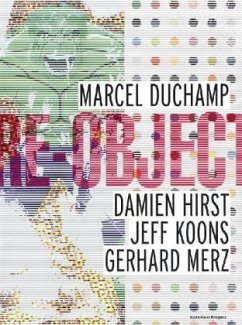Als Marcel Duchamp 1913/14 seine ersten Ready-Mades erfand, konnte niemand ahnen, welchen Sprengsatz er damit für die zeitgenössische Kunst zünden würde: Reale Gegenstände auf dem leeren Thron der künstlerischen Schöpfung, stellten nicht nur die Frage nach der Rolle des Künstlers, sondern beleuchteten auch die Bedingungen, die das Kunsturteil beeinflussen. Im Band Re-Object repräsentieren Marcel Duchamp und drei jüngere Zeitgenossen Gerhard Merz, Damien Hirst, Jeff Koons mit ihrem Werk eine markante Form der Auseinandersetzung mit dem Thema. Der Band Mythos , der eine entgegengesetzte und zugleich damit kommunizierende künstlerische Strategie beleuchtet, stellt Douglas Gordon, Matthew Barney und Cy Twombly im Zusammenhang mit Werken von Joseph Beuys vor. In jedem Band führen zwei Essays in das Thema ein jeweils aus historischer Perspektive und aus der weiteren Entwicklung der zeitgenössischen Kunst. Featuring Gerhard Merz, Damien Hirst, and Jeff Koons, Re-Object presents a numberof current positions that are characterized by a strategy of expression for which the object is both starting-point and focus. Historically, this approach is rooted in the work of Marcel Duchamp, who will also be represented in the show with several pieces. In Mythos , which constitutes a contrary and at the same time related position, works by Douglas Gordon, Matthew Barney, and Cy Twombly will be shown in conjunction with those of Joseph Beuys. Each catalogue contains two essays introducing the subject, one treating it from a historical perspective, the other examining it from the point of view of contemporary developments in the arts. In addition, various noted authorities will contribute essays on each of the four artists. Each of these books, richly illustrated with photos of the artists work as well as large-format images of many of the installations at the Kunsthaus Bregenz, documents how the selected artists fall under the themes of object or myth. Biographies and lists of exhibitions and bibliographies round off this survey of two major trends in twentieth-century art.
Bitte wählen Sie Ihr Anliegen aus.
Rechnungen
Retourenschein anfordern
Bestellstatus
Storno

